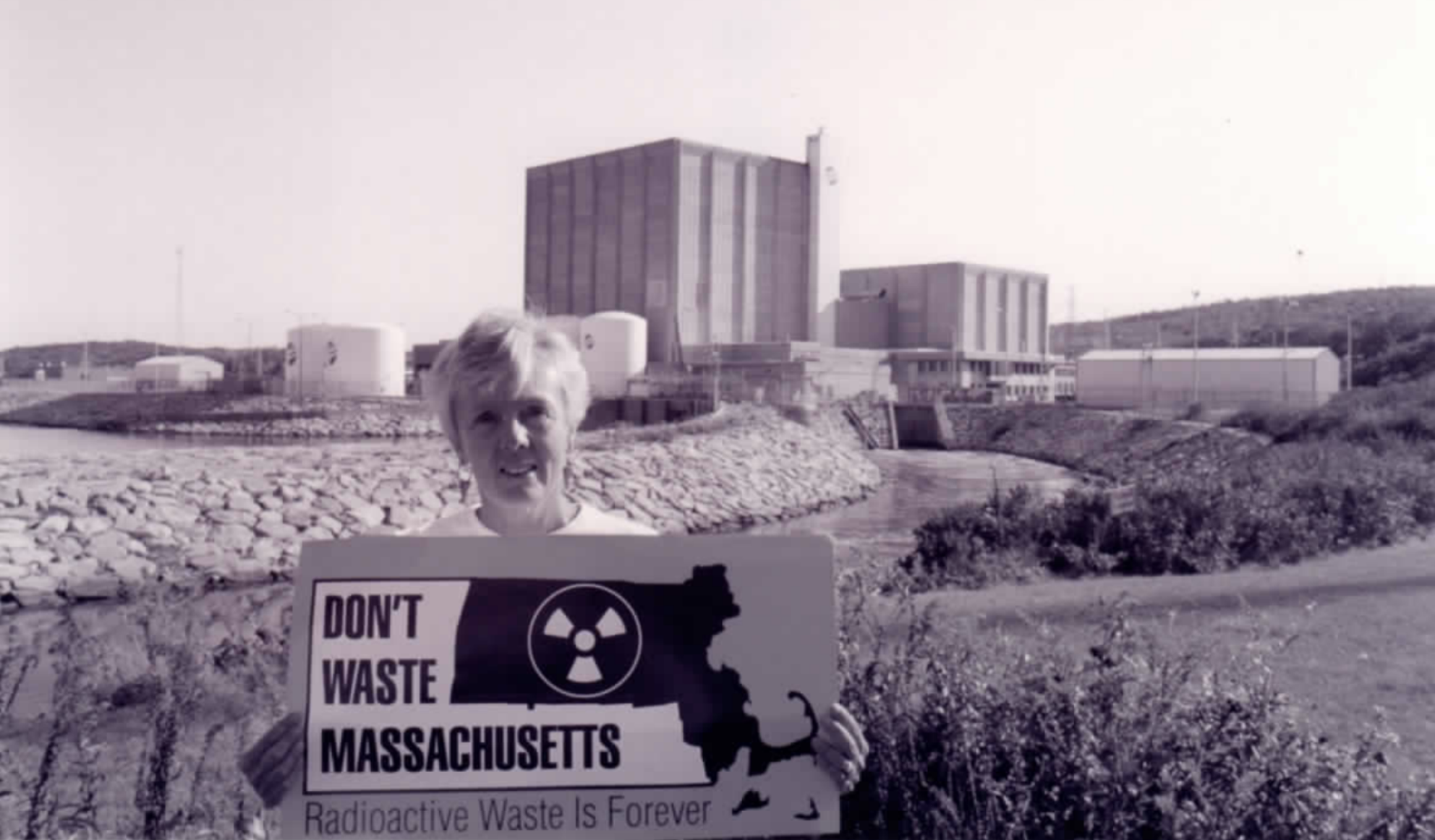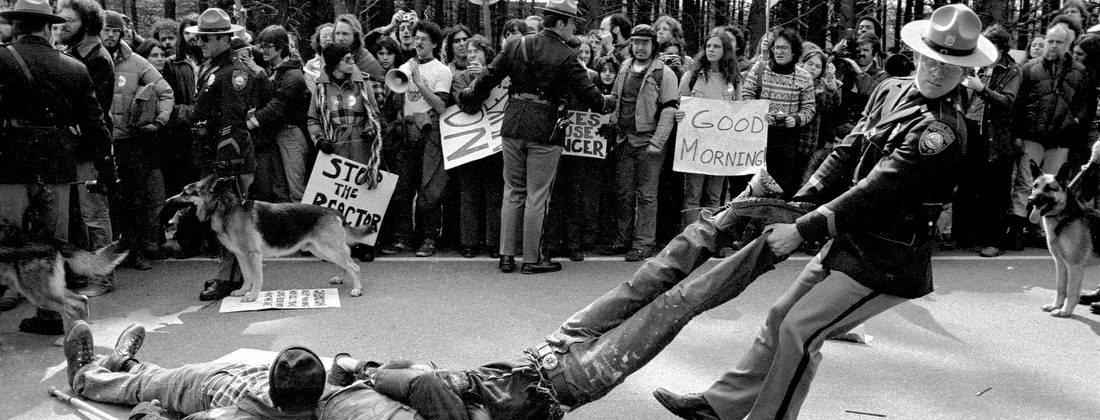Seabrook, NH Clamshell Alliance anti nuclear demonstrations on site of proposed nuclear power station (‘To The Village Square’ ) | Photo by and courtesy of Lionel Delevingne
NEW HAMPSHIRE—Mary Lampert can see the now-defunct Pilgrim Nuclear Power Station from her window in Duxbury, Massachusetts. The plant is no longer active, but Lampert, and others in the community, still fear what might happen.
“Something can go wrong, and it will contaminate a very large number of people,” she said.
Pilgrim hasn’t been active since May 2019, but it is still home to tons of radioactive nuclear waste. According to Lampert, the waste poses a major threat to the community.
“The consequence if something happens is that an area larger than Massachusetts would not be habitable,” she said about a scenario where the containers holding the nuclear waste were to be compromised. “That is an unimaginable consequence.”
Lampert, who is the director of the anti-nuclear organization Pilgrim Watch, said even if the nuclear waste remains undisturbed in its current storage place, she fears the less visible effects that the radioactive material could have on the community—cancer, multiple myeloma, birth defects.
Nuclear power has long been the nation’s largest producer of carbon-neutral energy, but with high-profile disasters like Cherbobyl and Fukushima, along with the fact that experts are unsure of how to dispose of the toxic waste that is a byproduct of the nuclear process, it is a divisive topic amongst environmental activists.
Headed into primary season, climate change and environmental policy is an easy talking point for Democratic candidates and even some Republicans. Supporting environmental regulations is an easy way to garner support, but one aspect of the climate policy debate is notably absent from the conversation.
Nuclear power is hardly ever discussed by candidates, but it appears to be one of the few issues relating to environmental policy that Democrats can’t come to an agreement on.
Candidates like Vermont Sen. Bernie Sanders, Massachusetts Sen. Elizabeth Warren, and Hawaii Congresswoman Tulsi Gabbard have said that, if elected, they would phase out the use of nuclear power plants. Others, including businessman Andrew Yang, support the continued development of new nuclear technologies.
“Nuclear power is a crucial component in the move towards creating sustainable, carbon-free energy for the United States. However, many people—including some other candidates—dismiss it out of hand,” according to Yang’s campaign website.
Yang’s plan includes investing money into the research and production of new nuclear technologies, and it hopes to have new plants producing nuclear energy as early as 2027.
Colorado Sen. Michael Bennet also advocates for the expansion of nuclear power.
“It is going to be part of the solution to climate change,” Bennet said over the weekend in Concord, adding that nuclear waste is a complicated issue.

Tom Steyer, another Democratic primary candidate, took a more nuanced approach. He said he would allow some existing plants to operate, as long as they are cost-effective, safe, and securely storing the radioactive waste.
“At this point what do we do?” Steyer said, addressing the waste produced at these plants. “We keep it on site and get scientists to work to figure out how to detoxify it, because we don’t have an answer.”
Steyer added that as president, he would make it a priority to figure out a proper way to permanently dispose of nuclear waste.
“Right now, we just don’t know what to do with nuclear waste. It lasts 100,000 years,” said Steyer. “It’s shockingly toxic. We’re going to have to figure out what to do with that waste for sure. I mean, 100,000 years. That is beyond comprehensible. That’s essentially forever.”
Currently, the United States has no permanent disposal site for the toxic waste produced at nuclear plants. Until the government finds a safe place to keep the radioactive waste, it is primarily kept at the plants where the waste was manufactured.
“America’s hometown of Plymouth will be a permanent radioactive waste depository for the indefinite future,” Lampert said. “And it could be for hundreds of years.”
Nuclear policy is a major concern, Lampert noted, when choosing whom she will vote for in national elections. Others who are active in protesting the expansion of nuclear policy agree.
Diane Turco, a founder of the anti-nuclear organization Cape Downwinders, said she would not consider voting for anyone who supports the further development of nuclear power.
“Any candidate who doesn’t say nuclear power should be shut down now has not really looked deeply into the subject,” she said. “We all want the climate crisis to be stopped today, but nuclear power is killing people now. It continues to produce this waste that the government does not know what to do with. … Nuclear power is a crisis in this country and around the world.”

But for many voters, nuclear policy just isn’t a major concern.
“There are so many other issues that are just more important,” said Stephen Bragdon, who lives in Keene and plans on voting in the primary. “Nuclear waste is a big issue, but it isn’t at the top.”
Allen Mendelson, another Keene resident, protested the opening of the nuclear power plant in Seabrook, New Hampshire when he was in his twenties in the 1970s. Now, Mendelson feels like there are other things to prioritize when choosing a candidate.
“I don’t think about it [when voting],” said John Neale, who lives and works near the Seabrook plant, “and very few people do.”
Still, Neale said he recognizes that nuclear waste is an issue, and that nuclear power is an imperfect solution to climate change.
As for Turco and Lampert from Cape Cod, for them, Sanders and Warren have the best views on nuclear power. Turco supports Sanders, but said that even his views on nuclear energy aren’t radical enough.
“He says phase out nuclear plants, but we say we need to shut them down now,” Turco said.

According to the US Energy Information Administration, nuclear power accounts for almost 20% of all electricity generated in the United States. Immediately and completely ending all production of nuclear energy would undoubtedly be controversial, but Turco noted that as long as nuclear plants continue to operate, nuclear waste will be produced.
“The nuclear industry has been around since the ’50s,” Turco said, “and they still don’t know what to do with this toxic man-made material.
“The waste disposal issue is a national crisis. It’s a national problem that no one is talking about.”
Lampert said that she can’t understand why the government would continue to allow nuclear waste to accumulate.
“If the water is overflowing, the sensible thing to do is turn off the faucet.
“People live in the community they chose to live in because of their jobs, for their kids, the beaches, the schools. … They don’t like to think about it, because if you really think about it, you might think this maybe this isn’t a good idea.”
This article was produced by the Boston Institute for Nonprofit Journalism as part of its Manchester Divided coverage of political activity around New Hampshire’s first-in-the-nation primary. Follow our coverage @BINJreports on Twitter and at binjonline.org/manchesterdivided, and if you want to see more citizens agenda-driven reporting you can contribute at givetobinj.org.




